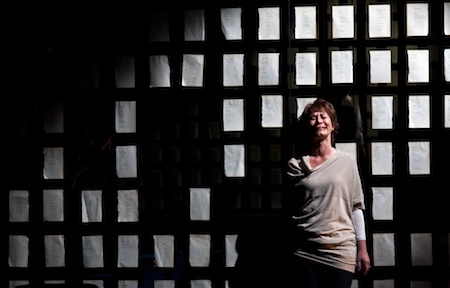Dear Readers
As some of you will already know, I've decided to close down Theatre Notes. It's a decision that's been staring me in the face for a while now, and it's fair to say that I've been in furious denial for months. Having to finish up here makes me more sad than I can say. Making TN has been more rewarding than I ever imagined when I idly thought, back in 2004, that it might be an interesting idea to begin a theatre review blog. It's been my privilege and joy to chronicle the theatre I've seen over the past eight years, and to bear witness to what I am quite sure will be seen as one of the richest periods of Australia's theatre history.
The reason is simple: I can't sustain the work of serious theatre criticism and also be a writer, without regularly slamming into the walls of exhaustion that have bedevilled me this year (and not only this year). It's a lamentable fact that writing doesn't get easier: it gets harder, as each new work demands that you reach further. I suspect the same is true of reviewing. I have always hated repeating myself, and aside from the works I'm already writing, the various projects I have in mind demand and deserve my proper attention. Despite all my flailing attempts to avoid it, I find that I have to make a choice: and it has to be for my own work.
This hit me with particular force a month or so ago, when, wondering why I was (again) so deeply tired, I tallied up my wordcount for this year. In 2012 I have written, at a conservative estimate, around 180,000 words. Of those, about 120,000, or two-thirds, are words of criticism, the vast majority of it for TN. The rest are accounted for by a short novel I finished in June, another novel which I have now half completed, and two libretti. Numbers are crude and, in matters of creative output, often misleading: but staring at those figures (and also at the notebook in which I record my progress with my novels), I couldn't any more deny to myself that this blog interferes with my work.
I've attempted to battle TN down to something sane, but I can't: TN is the kind of blog it is because of the hours it takes to make it. To turn it into a TN-lite would defeat its purpose more thoroughly than actually ceasing to do it. In the past few weeks I have gone over this decision again and
again, and I always reach the same conclusion. It's painful but it's
also right. Some people have suggested that perhaps I could find a way for TN to make money. But it's never been about the money: I've been able to afford to do it because of the income I made from my books. The resources that are most scarce are time and creative energy.
A disbelieving colleague whom I told a couple of weeks ago said, Nah, you'll miss it too much. And I will. I really will. I'll miss the shows, I'll miss the challenge of thinking and writing about performance, I'll miss the whole damn thing. I've long thought the Melbourne theatre community, in its generosity and robust vitality, its argumentativeness and its curiosity, is something special. It's a huge and precious part of my life, and will no doubt continue to be so. However, if I'm part of it, I will be mostly be on the other side of the fence. I can't imagine that I'll cease criticism altogether, as that part of me continues restless; but it will be an art I pursue as a secondary practice. And, yes, I've learned through experience never to say never. But this is it for TN. Eight years is a nice, sacred number. If you turn it sideways, it means infinity: and it's true to say that this period of my life has been infinitely rich.
I want to thank the theatre companies, here and interstate, who have supported TN over the years, and here I especially want to thank Michael Kantor and Stephen Armstrong at the Malthouse Theatre, who in the early days of blogging were miles ahead of the rest of the world, in actively encouraging the debate that happened here and in other theatre blogs around Melbourne. Thanks too to the many institutions who supported TN over the years, especially the Perth and Melbourne Festivals. My heart broke when I had to refuse a visit to the next Perth Festival in February, and yes, that was when I understood that I was serious. I must thank my family for routinely standing me up at the theatre doors and for patiently and sweetly supporting their obsessive mother and wife; my colleagues, both bloggers and print critics, and the countless TN commenters for the many stimulating and fascinating arguments; and most of all, the hundreds of artists who have given me so much delight and inspiration over so many years. And lastly, I want to thank you, the reader. There have been a lot of you: the total for unique visits to TN now stands at 1,250,050. That works out as an average of about 17,000 visits (or 23,000 page loads) a month over the past two years. Not bad for a determinedly local, specialist blog. Your interest made it all possible.
Over the next few weeks I'll do some housekeeping, to make TN more useful as an archive and resource. Several people have suggested that I should put together a book of reviews and essays, and when I have caught my breath, I will think about doing so. (Publishers are welcome to flood me with offers.) In the meantime, dear friends, again thank you. I'll see you on the other side.
With my love
Alison
Read More.....












